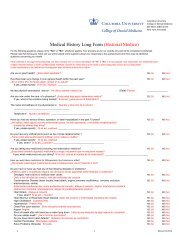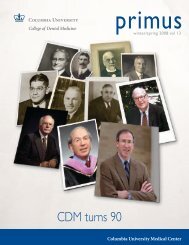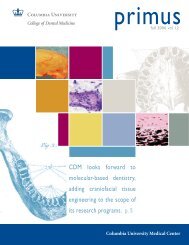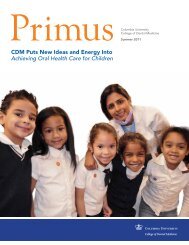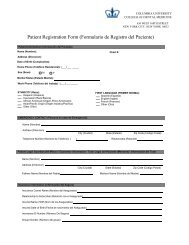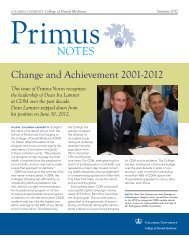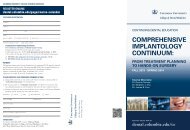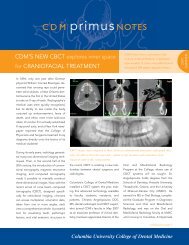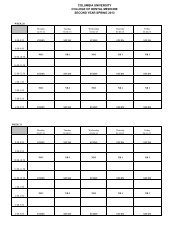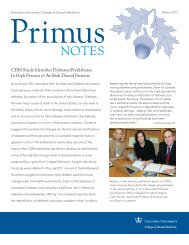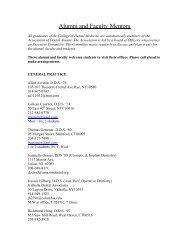Jarvie Journal - College of Dental Medicine - Columbia University
Jarvie Journal - College of Dental Medicine - Columbia University
Jarvie Journal - College of Dental Medicine - Columbia University
Create successful ePaper yourself
Turn your PDF publications into a flip-book with our unique Google optimized e-Paper software.
Volume 56, Spring 2013<br />
Enhancing Diagnostic Reasoning Abilities <strong>of</strong> Pre-Doctoral <strong>Dental</strong> Students with<br />
Introduction <strong>of</strong> Prosthodontics Education and Computer-Based Cognitive Tutor**<br />
Francis Oh 1 , O. Roger Anderson 2 , George S. White 3 , Dae-Won Haam 4 , Candice Zemnick 3*<br />
1 Postgraduate Prosthodontics, <strong>College</strong> <strong>of</strong> <strong>Dental</strong> <strong>Medicine</strong>, <strong>Columbia</strong> <strong>University</strong>, NY, NY;<br />
2 Mathematics, Science, and Technology Program, <strong>Columbia</strong> <strong>University</strong> Teachers <strong>College</strong>, NY, NY;<br />
3 Division <strong>of</strong> Prosthodontics, <strong>College</strong> <strong>of</strong> <strong>Dental</strong> <strong>Medicine</strong>, <strong>Columbia</strong> <strong>University</strong>, NY, NY;<br />
4 Implant Center, <strong>College</strong> <strong>of</strong> <strong>Dental</strong> <strong>Medicine</strong>, <strong>Columbia</strong> <strong>University</strong>, NY, NY<br />
*<br />
Faculty Mentor<br />
Introduction: Clinical diagnostic reasoning is the core competency <strong>of</strong> all healthcare pr<strong>of</strong>essional, which involves<br />
cognition and interaction with the environment to understand clinical situations, make diagnostic and therapeutic<br />
decisions, and address clinical problems. In this study, we propose that diagnostic reasoning training in pre-doctoral<br />
education can be enhanced with proper introduction <strong>of</strong> prosthodontics education and use <strong>of</strong> cognitive tutor. As<br />
defined by ADA, the essence <strong>of</strong> prosthodontics education is the development <strong>of</strong> diagnostic reasoning ability,<br />
commonly referred to as ‘Treatment Planning’. Cognitive tutor is a computer learning module based on cognitive<br />
psychology theory, particularly the ACT-R (Adaptive Control <strong>of</strong> Thought-Rational) theory. In this study,<br />
prosthodontics education and cognitive tutor technology are combined with various pedagogical theories, such as<br />
problem-based-learning, cognitive load theory, teacher-pro<strong>of</strong>ing, and more, to formulate an effective learning<br />
computer module that enhance pre-doctoral students’ diagnostic reasoning abilities.<br />
Objective: The purpose <strong>of</strong> the study is to develop and analyze the efficacy <strong>of</strong> a cognitive tutor that enhance predoctoral<br />
students’ diagnostic reasoning abilities, combining prosthodontics education and appropriate pedagogical<br />
theories.<br />
Materials & Methods: Randomized controlled mixed-method experimental study. Total N=40 (3 rd year dental<br />
students). Control group (N=20) uses traditional textbook and national board preparation materials on paper.<br />
Experimental group (N=20) used novel CTAT-based posthdontics education computer module (10 lessons). Both<br />
groups were given 3 days to study with materials provided. Pre-test and post-test were given and analyzed for<br />
quantitative analysis. 12-items qualitative questionnaire on 5-point Likert scale were given for qualitative analysis.<br />
Results: The P-value for the control group was 7.67 x E-09, therefore, improvement was statistically significant for<br />
the control group. The P-value for the experimental group was 4.42 x E-10, therefore, improvement was statistically<br />
significant for the experimental group. When we compared the score increase between the control and experimental<br />
groups, the analysis showed that a 2-tailed P-value is 0.015. It is concluded with 95% confidence interval that the<br />
experimental group performed significantly better than the control group. Qualitative analysis results show that<br />
students were positive toward cognitive tutor in terms <strong>of</strong> ease-<strong>of</strong>-use, contents integration, boosting confidence, and<br />
enhancing diagnostic reasoning.<br />
Discussion: While the results were favorable toward the initial premise <strong>of</strong> the study, there are several limitations to<br />
the study design: 1) The cognitive tutor was authored mainly with qualitative analysis results from medical education<br />
literatures. Since dental experts’ clinical reasoning process may differ from medical experts’, a new qualitative<br />
coding analysis must be performed. 2) Quantitative analysis <strong>of</strong> the study only shows the efficacy <strong>of</strong> the learning<br />
module, not the modality <strong>of</strong> reasoning process. We must conduct a qualitative coding analysis concurrently with the<br />
experiment on same experimental group before and after an intervention to truly claim the change in cognitive<br />
reasoning.<br />
**This is a pilot study for a longitudinal in-depth study addressing all <strong>of</strong> the above limitations, including<br />
cognitive coding, that is a part <strong>of</strong> Dr. Oh’s PhD dissertation thesis.<br />
61



